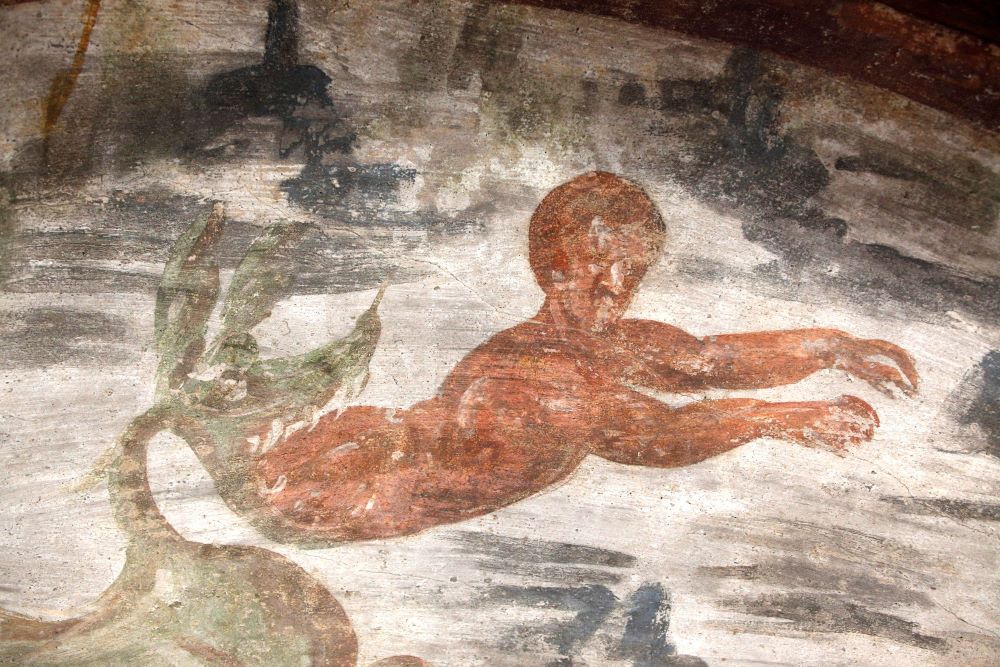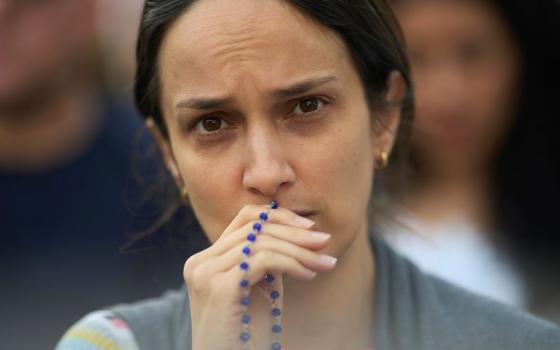
Jonah, the Old Testament prophet, is spit out of the whale in this fresco seen during the unveiling of two newly restored burial chambers in the Christian catacombs of St. Domitilla in Rome May 30, 2017. (CNS/Carol Glatz)
A while ago, I visited a relative whose only daughter had the chance to study abroad. Although the family's relatives in the area assured them that they would take care of her, he was initially opposed. The more he demonstrated his reluctance, the more demoralized his daughter felt, fearing that the opportunity might slip away. He had not thought through the matter and was already saying no. Later, he accepted the plan, bringing joy to the daughter and the entire family.
Reflecting on this experience, I realized how, as a significant other, I could either facilitate or hinder someone from realizing their dreams. I asked myself: Is our role not to enable the people in our lives to realize their dreams and allow God's purpose for their lives to unfold? This got me thinking about the vocation God has given to each person and how our coexistence forms the groundwork for its realization.
The Catechism of the Catholic Church teaches that we cannot separate the love of neighbor from the love of God. The human person is communal by nature, and it is through exchange with others, mutual service and dialogue that one develops their potential and responds to their vocation. Through society, each person becomes an "heir," receiving particular "talents" that enrich their identity and which they must develop. People owe "loyalty to the communities of which [they are] and respect to those in authority who have charge of the common good," the catechism says.
As leaders and ministers responsible for others, we owe it to each other to share our stories. Through our ministries, which entail service to one another, we respond to our vocation — the purpose for which God created each person. The National Association of Vocation & Formation Directors (2013) reminds us that our call is to promote greater engagement in our world by "reading the signs of the times" and responding with all our gifts. It dawns on me that ministry is the holy ground upon which we support each other to become the best version of ourselves. In this way, we encounter God through one another.
This realization should encourage us to cherish our ministries and approach them with the intention of finding God's will in every encounter. Therefore, united with God in prayer, we begin and end our day. At dawn, we offer ourselves to him; at dusk, we bring the people and experiences of the day to him. This implies that prayer fuels ministry, and ministry informs prayer.
I recognize that our daily encounters, especially in the ministries where we spend most of our waking hours, are not mere coincidences; God allows these interactions to give meaning to our lives so that we may find our life's purpose. An adage says, "The tree does not eat its own fruit." God equips us with gifts that are helpful for the people in our lives. Others celebrate ours, just as we celebrate theirs, enabling each person to respond to God's call. Hence, as the catechism says, the church encourages the participation of the greatest number of people in society and the formation of voluntary associations both locally and internationally in all spheres of life.
To draw others to God, we must fully immerse ourselves in ministry to bring out the best in another person while also transforming ourselves.
Through our ministries, others confirm what they believe about God, not from what they hear or read, but through personal encounter. When we use our giftedness fully for the sake of the common good, God provides for all societal needs. This way, we proclaim the good news in alignment with Jesus' life.
During His public ministry, Jesus lived for people, sharing life with them. In the process, they experienced God personally and discovered a power beyond their own. Their encounter with Jesus revealed the prophet in him (John 4:19).
According to Pope Francis, a prophet "points Jesus out to others" and bears witness to Him. In my experience, and as many can attest, we witness more by how we live than by what we say. Therefore, to draw others to God, we must fully immerse ourselves in ministry to bring out the best in another person while also transforming ourselves.
Advertisement
Ministry serves as the channel through which life is given. Once this happens, we begin to live out our purpose. God is always at work in us, and we have the privilege of making Him visible wherever we find ourselves, thus making God with us a reality in those contexts.
God quenches our thirst for Him through one another. Being aware that our life interconnects with others brings the understanding that every person is important. Equally, there is a need to understand that no ministry is more important than another. Each is a perfect fit for the people where we are right now. By playing our roles effectively, we fulfill God's desire for humanity. The consciousness that our actions affect others should drive us to do our best, lest we stand in the way of others' becoming.
As I reflect on ministry, the image that comes to mind is that of the world as a house with different rooms, each unique and well-equipped to meet everyone's needs for meaning. Today, we take care to make our houses, offices and public utilities user friendly. Just as we talk about caring for our common home in Laudato Si', we need to bring this notion to our human relationships — nurturing ourselves and others to become spiritually, physically and emotionally whole within a healthy physical environment. How lovely this would be.
Our coexistence should be like a "hypermarket" where we get almost everything under one roof at no cost. This requires us to take our ministries seriously because we encounter God in person-to-person relationships. Therefore, unnecessary absenteeism, refusal of mission and disregard for others should be things of the past. The urgency of the Gospel should characterize our manner of living. Our concern for others will grow because it is not about us, but about living God’s purpose for us.
The fruit of our ministries involves manifesting the values of Christ. This does not happen automatically; it requires support through prayer, availability, accountability, and the right disposition. Consequently, we confirm that our vocation comes from God, and the glory that comes from it returns to God. Remember, those Jesus healed, listened to and talked to always gave glory to God after their experience with Him. This can also be our experience.







